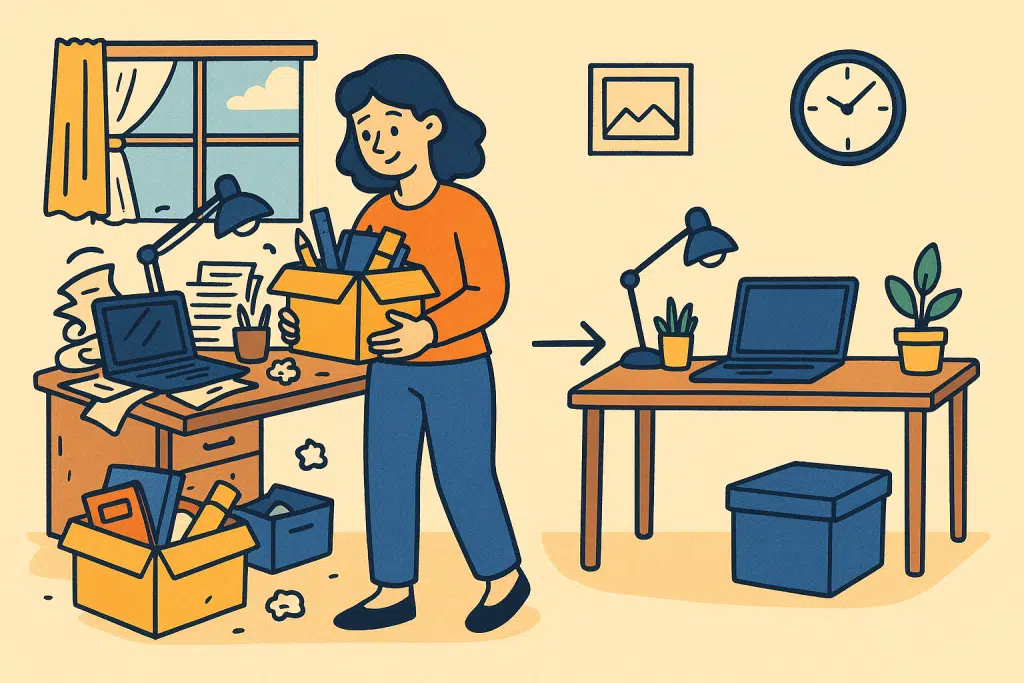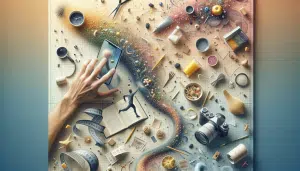Why Decluttering Your Space Leads to Greater Productivity
Lily Carter August 8, 2025
Let’s not beat around the dusty desk: having clutter everywhere is like mental junk food—it slows you down, drains energy, and makes you feel bleh. That’s why decluttering your space leads to greater productivity—and yes, I’m dropping that phrase again (third time’s a charm). In 2025, decluttering isn’t just about spotless Instagram shelves; it’s evolved into something that boosts your mental state, fuels career momentum, and rides the wave of tech-savvy trends. We’ll unpack the science, the trends, and the practical playbook—no emoji overload, and definitely no buzzwords like oasis journey. Just solid, smart vibes.

1. Science Says: Clutter = Cognitive Drain
Visual Noise and Focus Chaos
Your brain is a supercomputer with limited RAM. When you’re surrounded by clutter, it’s like having dozens of pointless browser tabs open—your thought-processor slows way down. Princeton researchers found that “visual reminders of disorganization drain our cognitive resources and reduce our ability to focus.” When clutter disappears, focus skyrockets.
Cortisol, Anxiety & Mental Overload
Clutter doesn’t just stress your brain, it physically raises cortisol—the stress hormone. Research from UCLA and other institutions links messy spaces to higher stress, poorer sleep, even unhealthy eating. Meanwhile, organized spaces calm cortisol and boost mental clarity.
Productivity Uplift
Here’s the kicker: one study found that organized workspaces can boost productivity by up to 30%. Let’s be honest—who wouldn’t want a 30% performance bump before lunch?
2. 2025 Decluttering Trends: What’s Hot Right Now
AI as Your Virtual Decluttering Coach
We’re not just tossing things and hoping for the best. AI tools like ChatGPT and Gemini are stepping in as “decluttering consultants”—upload a pic, get layout suggestions, spot clutter hotspots, and get you a game plan. It’s futuristic, data-driven, and surprisingly neutral (i.e., they don’t judge). Just remember your selfies might end up online, so watch privacy settings.
Micro-Decluttering: 10-Minute Wins
Massive purges are overrated. The trend is micro‑decluttering—spend 10–15 minutes on a drawer or shelf each day. It’s manageable, builds momentum, and helps you actually finish something instead of looping through “maybe” piles.
The “Poop Rule” (Yes, Really)
This one’s hilariously effective. Ask yourself: If this were covered in poop, would I still keep it? If the answer is nope, toss it. It’s graphic, blunt, and surprisingly liberating—especially great if you’re overwhelmed or have ADHD. Mental health pros are weirdly into it.
Mount Vernon Method: Clockwise Clarity
Inspired by George Washington’s estate, this method has you pick a corner and work clockwise across the room. It avoids scattering your focus and helps you keep momentum—especially ADHD- and neurodivergent-friendly. Pro tip: use a basket, set a timer, and clear one zone at a time.
Clutter Awareness Week Insights
Just this week (Aug 6–12, 2025), organizers highlighted key clutter zones that really impact well-being:
- Paper clutter – scan or shred statements
- Clothing – donate what no longer fits or resonates
- Entryways – simplify with labelled bins
- Hidden storage – clean out old toiletries or linens
- Aspirational clutter – those unused items you “just might use someday”
Tackling these first gives you major gains in calm and function.
Minimalism Is Still Chill
Minimalism isn’t about white walls and zero personality—it’s about reducing visual/mental load, lowering cortisol, and reclaiming joy in space. Cleaner bedrooms = better sleep, sharper focus, stronger routines, and less impulse buying.
3. Decluttering Your Space Leads to Greater Productivity: Practical Guide
Step-by-Step Rhythm
- Pick Your Method
- AI plan (take a photo, get layout tips)
- Poop Rule for brutal clarity
- Micro‑declutter bursts, 10–15 mins at a time
- Mount Vernon method for structured zones
- Start Small & Focus
- Maybe begin in your entryway or desk drawer (Clutter Awareness Week says high payoff).
- Use timer settings (15 mins = micro‑win).
- Sort Stuff Using Simple Labels
- Keep, Donate, Trash, Maybe (or Poop‑fail if you must).
- Be honest—if you haven’t used it in 6 months, chances are, you don’t need it.
- Organize, Don’t Just Hide
- Store things where they belong, not in “catch-all” chaos.
- Use bins, labels, or closed storage to reduce visual clutter
- Build Daily or Weekly Rituals
- A 5‑minute desk reset at the end of each workday makes tomorrow feel breezy.
- Put things back where they belong—hundreds of people report feeling more in control this way.
- Celebrate the Wins
- Even small clear-outs feel great. Take a selfie, DM a friend, do a happy dance.
4. Career & Productivity Payoff—Why You Gotta Care
- Improved Focus & Mental Clarity
No more “Where is that file?!”—you’re zoning in faster, working smarter. - Less Stress, Better Mood
Lower cortisol means fewer headaches, more creative brain nights. - Time Saved = More doing
Average person spends YEARS searching for lost stuff. Declutter and your future self wins. - Reflects Professionalism
A tidy space signals competence. “Oh, she’s got her life—and her desk—together.” That’s career gold. - Habit Spiral Upward
Those declutter rituals? They ripple into better routines: clearer email inboxes, planned priorities, stronger workflows.
5. Quick Comparison Table: 2025 Trends at a Glance
| Trend / Method | What It Does | Why It Works for Productivity |
|---|---|---|
| AI Declutter Coach | Suggests visual layout and storage fixes | Saves decision energy, strategy over stress |
| Micro-decluttering | 10-15 min targeted tasks | Builds momentum, less overwhelm |
| Poop Rule | Decisive sense-check for items | Cuts indecision; hilarious clarity boost |
| Mount Vernon Method | Zone-by-zone, clockwise movement | Keeps momentum, ADHD-friendly |
| Minimalism | Simplifies aesthetic and mental load | Reduces distractions, bolsters routine |
| Clutter Awareness Focus | Identifies high-impact clutter zones | Targets stress hotspots fast |
Wrap-Up: Your Space, Your Brain, Your Career
If you’re still sitting there with clutter whispering in your ear—“Maybe keep that,”—tell it to zip it. Decluttering your space leads to greater productivity, period. It clears your mind, saves time, and gives your career the soft edge of clarity and calm. With AI as your coach, micro-habits as your arsenal, and trends like the Poop Rule and Mount Vernon method shaking things up, there’s no excuse not to start now.
References
- Baer, D. (2016). The Science of Why You Should Spend Money on Experiences, Not Things. Fast Company. https://www.fastcompany.com/
- McMains, V. (2019). Why a Cluttered Space Is Making You Less Productive. Harvard Business Review. https://hbr.org/
- Kondo, M. (2021). The Life-Changing Magic of Tidying Up: How Decluttering Boosts Your Work Focus. Time. https://time.com/







